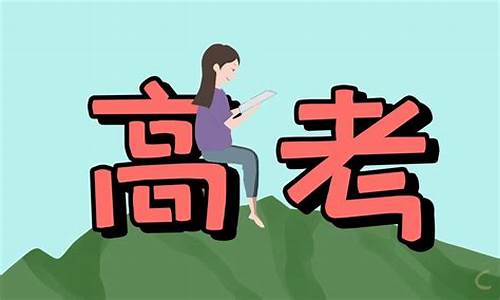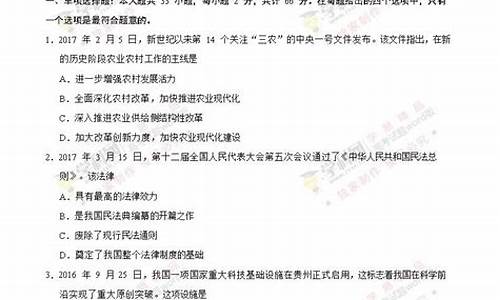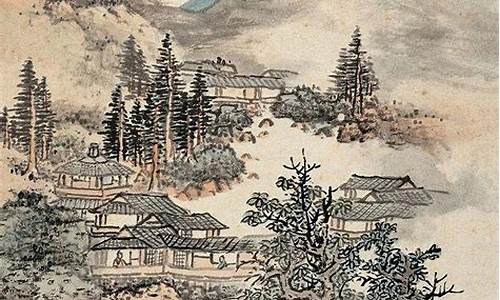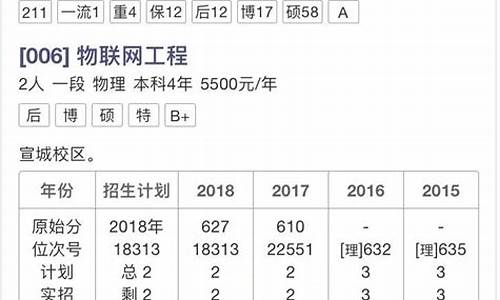您现在的位置是: 首页 > 教育研究 教育研究
高考英语听力题库,播放高考英语听力题
tamoadmin 2024-06-10 人已围观
简介1.英语听力经典开头2.高考英语听力提前读题的意义3.求福建省历年高考英语听力音频和原文4.求2013年天津英语高考听力答案!顺便描述题目的最好,求a,b卷的答案啊!看你要哪些方面的?高考听力的有:嘉兴英语网、中学学科网、高考试题库、中学英语教学资源网、中国统一教育网大众化学习提高的有:普特英语听力网、可可英语网、大耳朵英语网、人人听力网、VOA英语学习网、新东方等主要你上网搜索相关内容,勤学苦听
1.英语听力经典开头
2.高考英语听力提前读题的意义
3.求福建省历年高考英语听力音频和原文
4.求2013年天津英语高考听力答案!顺便描述题目的最好,求a,b卷的答案啊!
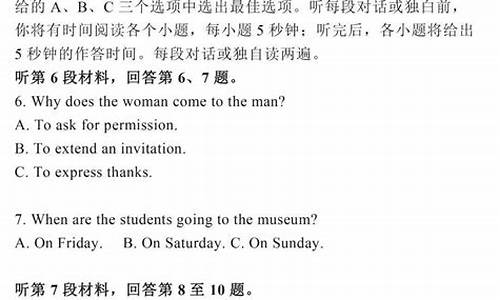
看你要哪些方面的?
高考听力的有:嘉兴英语网、中学学科网、高考试题库、中学英语教学资源网、中国统一教育网
大众化学习提高的有:普特英语听力网、可可英语网、大耳朵英语网、人人听力网、VOA英语学习网、新东方等
主要你上网搜索相关内容,勤学苦听,相信你还会发现你自己喜欢的学习网站。
祝你进步。
英语听力经典开头
第三部分 语言运用(共两节,满分45分)
第一节 完形填空(共20小题;每小题1.5分,满分30分)
阅读下面短文,从短文后各题所给的A、B、C和D四个选项中,选出可以填入空白处的最佳选项,并在答题纸上将该项涂黑。
Alia Baker is a librarian in Iraq. Her library used to be a 36 place for all who loved books and liked to share knowledge. They 37 various matters all over the world. When the war was near, Alia was 38 that the fires of war would destroy the books, which are more 39 to her than mountain of gold. The books are in every language ? new books, ancient books, 40 a book on the history of Iraq that is seven hundred years old. (kaoshi.yjbys.com)
She had asked the for 41 to move the books to a 42 place, but they refused. So Alia took matters into her own hands. 43 , she brought books home every night, 44 her car late after work. Her friends came to 45 her when the war broke out. Anis who owned a restaurant 46 to hide some books. All through the 47 , Alia, Anis, his brothers and neighbours took the books from the library, 48 them over the seven-foot wall and 49 them in the restaurant. The books stayed hidden as the war 50 . Then nine days laters, a fire burned the 51 to the ground.
One day, the bombing stopped and the 52 left. But the war was not over yet. Alia knew that if the books were to be safe, they must be 53 again while the city was 54 . So she hired a truck to bring all the books to the houses of friends in the suburbs(郊区). Now Alia waited for the war to end and 55 peace and a new library.
36. A. meeting B. working C. personal D. religious
37. A. raised B. handled C. reported D. discussed
38. A. worried B. angry C. doubtful D. curious
39. A. practical B. precious C. reliable D. expensive
40. A. then B. still C. even D. rather
41. A. permission B. confirmation C. explanation D. information
42. A. large B. public C. distant D. safe
43. A. Fortunately B. Surprisingly C. Seriously D. Secretly
44. A. starting B. parking C. filling D. testing
45. A. stop B. help C. warn D. rescue
46. A. intended B. pretended C. happened D. agreed
47. A. war B. night C. building D. way
48. A. put B. opened C. passed D. threw
49. A. hid B. exchanged C.burnt D. distributed
50. A. approached B. erupted C. continued D. ended
51. A. restaurant B. library C. city D. wall
52. A. neighbours B. soldiers C. friends D. customers
53. A. sold B. read C. saved D. moved
54. A. occupied B. bombed C. quiet D. busy
55. A. dreamed of B. believed in C. cared about D. looked for
非选择题部分 第三部分 语言运用(共两节,满分45分)第二节(共10小题:每小题1.5分,满分15分)
阅读下面材料,在空白处填入适当的内容(1个单词)或括号内单词的正确形式。
Last October , while tending her garden in Mora , Sweden , Lena Pahlsson pulled out a handful of small 56 (carrot) and was about to throw them away. But something made her look closer , and she noticed a 57 (shine) object. Yes, there beneath the leafy top of one tiny carrot was her long-lost wedding ring.
Pahlsson screamed 58 loudly that her daughter came running from the house. ?she thought I had hurt 59 (I),?says Pahlsson
Sixteen years 60 (early), Pahlsson had removed the diamond ring 61 (cook) a meal. When she wanted to put the ring back on later, it was gone. She suspected that one of her three daughters ?then ten, eight, and six? had picked it up, but the girls said they hadn't. Pahlsson and her husband 62 (search) the kitchen, checking every corner, but turned up nothing. ?I gave up hope of finding my ring again," she says. She never replaced it.
Pahlsson and her husband now think the ring probably got 63 (sweep) into a pile of kitchen rubbish and was spread over the garden, 64 it remained until the carrot?s leafy top accidentally sprouted (生长) through it. For Pahlsson, its return was 65 wonder.
第四部分 写作(共两节,满分40分)第一节 应用文写作(满分15分)
假定你是李华,计划组织一次郊游,请给你的英国朋友Chris写封邮件邀请他参加。内容包括:
1. 参加者;
2. 时间、地点;
3. 活动:登山、野餐等。
注意:
1. 词数80左右;
2. 可以适当增加细节,以使行文连贯。
第二节 读后续写(满分25分)
阅读下面短文,根据所给情节进行续写,使之构成一个完整的故事。
On a bright, warm July afternoon, Mac Hollan, a primary school teacher, was cycling from his home to Alaska with his friends. One of his friends had stopped to make a bicycle repair, but they had encouraged Mac to carry on, and they would catch up with him soon. As Mac pedaled (骑行) along alone, he thought fondly of his wife and two young daughters at home. He hoped to show them this beautiful place someday.
Then Mac heard quick and loud breathing behind him. ?Man, that's a big dog!? he thought. But when he looked to the side, he saw instantly that it wasn?t a dog at all, but a wolf, quickly catching up with him.
Mac?s heart jumped. He found out his can of hear spray. With one hand on the bars, he fired the spray at the wolf. A bright red cloud enveloped the animal, and to Mac's relief, it fell back, shaking its head. But a minute later, it was by his side again. Then it attacked the back of Mac's bike, tearing open his tent bag. He fired at the wolf a second time, and again, it fell back only to quickly restart the chase(追赶)。
Mac was pedaling hard now. He waved and yelled at passing cars but was careful not to show down. He saw a steep uphill climbbefore him. He knew that zxxk once he hit the hill, he?d be easy caught up and the wolf?s teeth would be tearing into his flesh.
At this moment, Paul and Beeky were driving their car on their way to Alaska. They didn?t think much of it when they saw two cyclists repairing their bike on the side of the road. A bit later, they spotted what they, too, assumed was a dog running alongside a man on a bike. As they got closer, they realized that the dog was a wolf. Mac heard a large vehicle behind him. He pulled in front of it as the wolf was catching up fast, just a dozen yards away now. (kaoshi.yjbys.com)
注意:
1. 所续写短文的词数应为150左右;
2. 应使用5个以上短文中标有下划线的关键词语;
3. 续写部分分为两段,每段开头语已为你写好;
4. 续写完成后,请用下划线标出你所使用的关键词语。
参考答案第一部分 听力
1. C 2. A 3. C 4. B 5. A
6. C 7. A 8. B 9. C 10 . B
11. B 12. C 13. A 14. B 15. A
16. B 17. C 18. A 19. C 20 . A
第二部分 阅读理解
21. C 22. D 23. B 24. D 25. A
26. C 27. B 28. A 29. B 30. C
31. D 32. C 33. B 34. A 35. F
第三部分 语言运用
36. A 37. D 38. A 39. B 40. C
41. A 42. D 43. D 44. C 45. B
46. D 47. B 48. C 49. A 50. C
51. B 52. B 53. D 54. C 55. A
56. carrots 57. shiny/shining 58. so
59. myself 60. earlier 61. to cook
62. searched 63. Swept 64. where
65. a
第四部分 写作
(略)
更多2017年高考英语真题分享阅读:高考英语听力提前读题的意义
英语听力经典开头:
试音开始(一片空白)然后考试铃声响了,一会儿,听力部分正式开始(听例题)你所听到的内容是excuseme,canyoutellmehowmuchtheshitis?it's9.15。衬衫的价格是9磅15便士,因此你选B。
高考英语听力的技巧:
1、利用听录音前的时间,迅速地捕捉每个小题题干选项所提供的信息,预测短文或对话可能涉及到的内容,这样听录音材料时就有的放矢,有所侧重,提高答题的准确率。
2、注意重复的词语,这些词通常会给你一些线索,还会帮你回忆起你在题目中听过的人名和事物等名称。
3、注意各个选项中的主要区别。你可能会看到一些不同的名字或地点或不同的动词,这些不同之处将会帮你确定这道题中哪些是你要听的关键,即关键词。
4、克服犹豫不决的毛病,对自己有把握的试题应快速作答,对无把握的试题也要在所听信息的基础上排除错误选项,进行优化处理。不会作答的,立即暂时搁置。
5、目前高考听力测试中短文理解大部分是记叙文或讲话稿,所以听录音时重在听懂每句话的意思和内涵。
注意捕捉文中所涉及的人物(who)、事件(what)、时间(when)、地点(where)、原因(why)、方式(how)、程度(howlong,howsoon,howmuch)、数字(howmany/howmuch)、选择(which)等,以便检查答案。
求福建省历年高考英语听力音频和原文
第一类:根据听力内容选择答语
如某题的选项有:
A You are welcome B Thank you very much C Thank you all the same.
先回忆一下.A选项表示“不用谢”,所以听力内容大概为Thanks…/Thank you (for)…/It’s kind of you to…. 而B表示“谢谢”可以回答here you are / Can I help you等,C 仍然表示谢谢你,用于你询问别人,别人不知道的时候的回答。本题的听力内容为:I’m sorry,Idon’t know the way to the station,I’m new here. 故而答案应为C。
又如某一题的选项有:
A What a good idea. B With pleasure. C My pleasure.
我们来分析一下,在日常交际用语中A应该用于回答表示建议的句子。如 Let’s…/ Shall we …/ What about…/ Why not…等; B表示“乐意效劳”,常用于别人向你寻求帮助(Can you help me?)时的回答;而C表示不用谢,用于别人向你感谢时的回答。
而听力内容为:Shall we go to the theatre next Sunday? 故而答案应为A。
第二类:根据听力问题,选择答语
如某题的选项为
A It was sunny. B It was Tuesday. C It was January 22,2006.
我们来分析一下,A选项的问题应是What was the weather like?/ How is the weather? 时态应为过去时;B选项的问题应为What day was it …? 时态应为过去时; C选项的问题应为What was the date…? 时态应为过去时。而听力内容为 What day was it yesterday? 故而答案应为B。
又如某题的选项为
A Yes, there is. B Yes, there was. C Yes, there were.
根据这些内容选项A的问题应为 Is there…? B的问题应为Was there..? C的问题应为Were there …? 而听力内容为: Was there a dinosaur show in the Science Museum? 故而答案应为B。
第三类:听对话,每段对后有一个问题,根据对话内容和问题选出答案。某题的选项为:
A She is a nurse. B She is a worker. C She is a teacher.
我们可以从以上选项中看出,对话中谈论的主题应与she 的职业有关,这是我们在听力过程中应特别注意。
听力内容为:M: What does your father do ,Lily?
W: He teaches English just as my mother does.
Q: What does Lily’s mother do?
由此可见,答案应选C。
第四类:听短文,根据听力短文内容,在各题所给的A、B、C、D四个选项中选出一个选项。如某个听力短文有如下的问题和选项:
( )⒗ Where did the young boy's ball fall?
A. In the river. B. Into the net. C. Inside the house. D. In the street.
( )⒘ Why did the boy come back?
A. Because he wanted to get back his ball.
B. Because he wanted to say sorry to the lady.
C. Because he wanted to see the lady.
D. Because his father asked him to come.
( )⒙ Who was the man?
A. The boy's father. B. The boy's teacher.
C. The lady's husband. D. The man the boy asked to come.
( )⒚ Who did the man think the lady was?
A. The boy's mother. B. The boy's sister.
C. The boy's teacher. D. The boy's neighbor.
( )⒛ How much did the man want to fix the window?
A. $10. B. £10. C. ¥10. D. 100 jiao.
从这段听力所给出的问题及选项,我们不难看出,听力要求我们要将短文的地点、起因、人物和一些基本的事件信息要听得出来。所以我们在听的时候要特别留意这些内容。
而这个听力短文的内容为:(划线部分为我们的问题涉及内容)
A young boy was playing with a ball in the street. He kicked it too hard,(第16题) and it broke the window of a house and fell inside. A lady came to the window with the ball and shouted at the boy, so he ran away.(第17题) But he still wanted his ball back. A few minutes later he returned and knocked at the door of the house. As soon as the lady opened the door, he said, "My father is going to come and mend your window very soon."
After a few more minutes a man came to the door with tools in his hand, so the lady let the boy take his ball away. (第18题、20题)When the man finished mending the window, he said to the lady, "Ten dollars, please." (第19题)“ But aren't you the boy's father?”asked the lady, looking very surprised.
故而,答案应为16 C 17 A 18 D 19 A 20 A
又如我们有下面一篇听力短文:
根据所听短文内容, 判断下列句子的正(T)与误(F)。
⒗ The word "hello" is widely used in many countries.
⒘ Thomas Edison was the first man to use the word "hello" on the telephone.
⒙ Telephone was invented by Thomas Edison.
⒚ Edison was good at talking.
⒛ At first, people believed they could hear each other on the phone.
通过阅读上面5个句子,我们初步判断该听力短文与电话、电话用语以及人物Thomas Edison有关。结合我们学过的历史知识,我们知道电话不是Thomas Edison发明的,首先判断第18题为错的(F)。然后,听的重点在hello这个单词以及Thomas Edison身上了
而这个听力短文的内容为:(划线部分为我们的问题涉及内容)
(第16题)Maybe the word "hello" is used more often than any other one in the English language. Every one in the United States and other countries uses the word, again and again, every day of the week.
(第17题)The American inventor Thomas Edison is believed to be the first person to use "hello" on the telephone soon after the invention of it.
(第20题)At first, people began their words on the telephone with "Are you there?" They were not sure the small machine could really carry voices.
(第19题)Edison was a man of few words. He wasted no time. The first time he picked up the telephone, he did not ask if anyone was there. He was sure someone was there and only said "hello".
From then on, "hello" is often heard when you picked up the telephone.
故而,答案应为16 T 17 T 18 F 19F 20 F
总之,我们在作听力时应作到以下几点:
一、争取时间 提前审题。 领到试卷后应迅速浏览听力部分,尽快根据题干和选项预测可能出现的录音内容,努力寻求四个选项之间的差别,提高捕捉信息的准确度。
二、沉着答题 遇难不慌。 听力测试的时间是预先设定的,通常为12分钟左右。因此,要培养抢记内容的能力,如人名、地名、时间、数字等。特别是对那些一时拿不准、写不出的词要学会用音标或缩写词作快速记录,以便在录音结束后为自己创造追忆的条件。另外,如果在做题过程中遇到确实听不懂的,要舍得果断放弃,集中精力,作好后面的题,切不可揪住一点不放,因小失大。
三、仔细检查 理顺关系。听力结束后,不要急于做笔试题。要利用头脑中还保留的短暂记忆和记录的内容,对那些不太肯定的答案进行推敲并合理想象。相对而言,听力第二部分内容难度降低,比较容易得分,做短文理解题时应注意如下几点:(一)、听短文录音时要重在意会,不能搞逐字对译。要特别注意捕捉一篇短文开头的第一句或最后一句话,因为它们往往是该文中心思想所在的主题句。(二)、短文后所给的试题一般是紧扣考生所听到的内容按先后顺序编排的,因此可以根据所听有关内容的先后顺序来逐一考虑各题,以免理不清头绪,解答问题时张冠李戴。(三)、所给出的选项,选择标准往往是看其是否与所听内容吻合。如果仅根据有关语法结构上的基础知识就可判定选择答案的话,该试题就达不到考查听力理解的目的。四、听力结束后有些地方仍然没听清,在答题过程中切忌胡乱猜测,要依据自己已听到的部分内容和已掌握的知识和常识,通过分析、推理等找到最接近的答案。五、短文一般在听两遍的情况下,难以将所有内容全部记忆下来。因此听力前充分利用间隙时间,浏览试题有关书面材料,预测内容。在听力过程中要特别留意并记住有关的信息,提高答题的正确率。
求2013年天津英语高考听力答案!顺便描述题目的最好,求a,b卷的答案啊!
2014年福建省高考英语听力原文
Text 1
W: Excuse me. This is the address. How do I find it?
M: Right. You’ll need a street map. Here’s one, and I’ll show you where it is.
Text 2
W: Oh my! My car broke down, and I have to meet my aunt at the railway station before noon.
M: You’re lucky. I can drop you off on my way.
Text 3
W: Did you hear that Mr. Peterson is coming next week, Gordon?
M: Yes, so I called all the department heads to my office this morning. We need to give him reports on our program.
Text 4
W: I hope you like the book I lent you. I wasn’t sure if you’d be interested.
M: I had the same doubt at first. But once I started, I simply couldn’t put it down.
Text 5
W: What is going on? It’s May, and we still have to wear warm clothes.
M: Well, there’s some good news on the radio. You probably can wear shorts tomorrow.
Text 6
W: Harry, let’s play some ping-pong today.
M: I’d love to play a set or two, but my right arm hurts. I’ve decided to stop playing ping-pong until it feels better.
W: Well, how about going skating?
M: I’d like to, but my knee hurts, too.
W: Harry, stop making excuses! You’re just lazy.
M: No, I’m not! You know, there’s a basketball match on TV today. Let’s just stay home and watch it.
W: OK. You stay, and I’ll play with Helen.
Text 7
W: What do you want to do tonight?
M: How about going to the cinema? I should be home from work at 5:45. Then we can go out and eat before we see a film.
W: What do you want to see?
M: There’s a good art film at the Green House Cinema.
W: Let’s see…it starts at 6:15. I don’t think we can get there in time to see the beginning. How about the action film at the New State Cinema? It starts at 6:50. Perhaps the 7:00 one at the UME Cinema is even better. It stars Jackie Chan.
M: OK, that’s fine. I like him, too.
Text 8
M: Hey, Lucy. Do you have some time to talk about next week’s trip with me?
W: Sure, Dave.
M: OK. So, we’re leaving on Monday from Hartsfield International Airport, and returning on Friday. Do we take ourselves to the airport? Maybe we need to book a taxi, or just go by bus.
W: No, we don’t have to. The company car will pick us up and take us there.
M: Oh, that’s good. When?
W: Our flight leaves at 11:00 a.m., so they should pick us up between 8:00 and 9:00 a.m. Besides, the company pays for our trip, including hotel and food.
M: How much will that be?
W: Well, New York is a pretty expensive city. So, each of us will get $200 a day.
M: Oh, OK. Thanks for telling me that.
W: You’re welcome.
Text 9
W: Please sit down. Let’s see…you’re Mr. Smith. Is that correct?
M: Yes. John Smith.
W: And you’re interested in this job?
M: Yes, I am. I’ll graduate from college the coming June. My major is Chinese.
W: I see. Have you ever done any work in this field?
M: Yes, I used to be a tour guide for Chinese travellers.
W: Good. Now, how much money do you expect to have for a year?
M: From what I’ve read, it seems that a starting pay would be around $12,000 a year.
W: Here, you would start at $10,500 for the first year…a kind of training period. Then you would go to $15,000.
M: That sounds fair enough. What do you think are the chances for me to get a job here?
W: Well, I’m talking to three people today and four tomorrow. We’ll be hiring two people. You’ll hear from us sometime next month. Good luck! And thanks for coming in today.
Text 10
M: Well, I’d love to share with you my personal opinions on city life and life in small towns. I grew up in a small town until I was 18 and then moved to a big city, so I have experienced the good and bad sides of both. I never thought that I would like living in a big city, but I was wrong. After ten years of living in one, I can’t imagine ever living in a small town again. Surely small towns and big cities both have some problems in terms of transport. In a small town, you have to own a car to make life comfortable. You can’t get around without one because there isn’t any kind of public transport. Big cities generally have heavy traffic and expensive parking, but there you have a choice of taking public transport, which is cheaper than driving. So, if you don’t have a car, you’d better live in the city. I also love the exciting life in big cities. I can always enjoy a lot of films, concerts, and other wonderful shows. However, these things are not common in small towns. The final thing I like about large cities is that you can meet different kinds of people. However, you seldom find such a variety of people in a smaller town. I think that living in an area where everyone was just like me would quickly become dull. Of course, safety should be considered, and that’s one area where small towns are better than big cities. Still, I would rather be a bit more careful and live in a large city than to feel safe but dull.
第一节(共5小题,每小题1.5分,满分7.5分)
听下面5段对话。每段对话后有一个小题,从题中所给的A、B、C三个选项中选出最佳选项,并标在试卷的相应位置。听完每段对话后,你都有10秒种的时间来回答有关小题和阅读下一小题,每段对话仅读一遍。
例:How much is the shirt?
A. £19.15 B. £9.18 C. £9.15
答案是C。
1.What does the woman want to do?
A. Find a place. B. Buy a map. C. Get an address.
2.What does the man do for the woman?
A. Repair her car B. Give her a ride C. Pick up her aunt.
3.Who might Mr. Peterson be?
A. A new professor B. A department head C. A company director.
4. What does the man think of the book?
A. Quite difficult. B. Very interesting. C. Too simple.
5. What are the speakers talking about?
A. Weather B. Clothes C. News.
第二节(共15小题,每小题1.5分,满分22.5分)
听下面5段对话或独白,每段对话或独白后有几个小题,从题中所给的A、B、C三个选项中选出最佳选项,并标在试卷的相应位置。听每段对话或独白前,你将有时间阅读各个小题,每小题5秒钟;听完后,各小题给出5秒钟的作答时间。每段对话或独白读两遍。
听第6段材料,回答6、7小题。
6. Why is Harry unwilling to join the woman?
A. He has a pain in his knee.
B. He wants to watch TV.
C. he is too lazy.
7. What will the woman probably do next?
A. Stay at home.
B. Take Harry to hospital.
C. Do some exercise.
听第7段对话,回答8、9小题。
8. When will the man be home from work?
A. At 5:45 B. At 6:15 C. At 6:50
9. Where will the speakers go?
A. The Green House Cinema. B. The New State Cinema. C. The UME Cinema.
听第8段对话,回答第10至12题。
10. How will the speakers go to New York?
A. By air. B. By taxi. C. By bus.
11. Why are the speakers making the trip?
A. For business. B. For shopping. C. For holiday.
12. What is the probalbe relationship between the speakers?
A. Driver and passenger B. Husband and wife C. Fellow workers.
听第9段对话,回答第13至16题。
13. Where does this conversation probably take place?
A. In a restaurant. B. In an office. C. In a classroom.
14. What does John do now?
A. He’s a trainer. B. He’s a tour guide. C. He’s a college student.
15. How much can a new person earn for the first year?
A. $10,500. B. $12,000. C. $15,000.
16. How many people will the woman hire?
A. Four B. Three C. Two
听第10段材料,回答第17至20题。
17. How long has the speaker lived in a big city?
A. One year. B. Ten years. C. Eighteen years
18. What is the speaker’s opinion on public transport?
A. It’s comfortable B. It’s time-saving C. It’s cheap.
19. What is good about living in a small town?
A. It’s safer. B. It’s healthier. C. It’s more convenient.
20. What kind of life does the speaker seem to like most?
A. Busy. B. Colourful. C. Quiet.
A卷:1、问男的哪天leave,是明天还是星期三早上,男的说星期三早上,星期五回来(back)。
B。wednesday
2、问女的建议怎么去,女的说离的不远,步行(on foot)就行。
C 。on foot
3、问女的啥感觉,男的说在沙滩上,女的说很爽,像在天堂一样(heaven),永远都不想走了,很放松。
A。relaxed
4、问男的暗示啥了,女的问男的能不能带自己,男的说行,就是有个会(speech),带着女的就迟到了,女的说没事没事。
A。can't give her a ride
5、问男的对**的态度是啥,女的问男的**咋样,自己错过啥好东西没,男的说几乎没错过啥(hardly),自己看的时候一直看表(那不就是嫌时间过得慢呗,那不就是不好看呗。)
C 。disappointing
6、问女的去干啥,女的说swimming。
B。go to swimming pool
7、问男的要干啥,男的说自己一下午都在图书馆呆着(library),有个论文(paper),明早交(due 、tomrrow)。
A。work on paper
8、问女的要干啥,女的说自己数学还行,帮男的补习,男的说行,啥时候,女的说游完泳,然后俩人约图书馆门口见。
B。help him with his studies
9、问男的买车干啥,男的说自己想锻炼(get exercise),不想老坐公交,后面也提到不想买比赛车。
C。get some exercise
10、问女的建议买啥,男的没多少钱(目测是个屌丝),女的说那买不成好车(top class),有几辆二手(used)条件也不错(good condition)要不看看。
B。uesd bike
11、问女的建议买车先看啥,女的说自己骑着上班的话就得舒服(comfort)。
A。comfort
12 、问晚会以前(originally)几点结束,他说以前就晚九点半开始午夜就结束(midnight),现在改成开一夜。
C。at midnight
13、问钱干啥了,男的说不是给自己了(好像是,记不太清了),也不是给主人(owner),给病小孩儿了(sick children)。
A。sick children
14、问票是用来干啥的(what is ticket used as?好像是这个,如果错了就无视)男的说现在party开放给大家了,你的票现在就是提醒你有这个party,你可以带一堆人来喝免费啤酒(好么,又一堆屌丝)。
B。reminder of party
15、独白目的,一开篇男的就说自己是来宣布新改变的。
C。announce new changes
B卷记不清了:但是答案是肯定对的ABBCA ACBCB ABCAC
